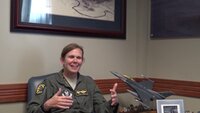| Title |
Sabric, Regina OH19_069 |
| Creator |
Weber State University, Stewart Library: Oral History Program. |
| Contributors |
Sabric, Regina, Interviewee; Rands, Lorrie, Interviewer; Rands, Natalie, Video Technician |
| Description |
The Beyond Suffrage Project was initiated to examine the impact women have had on northern Utah. Weber State University explored and documented women past and present who have influenced the history of the community, the development of education, and are bringing the area forward for the next generation. The project looked at how the 19th Amendment gave women a voice and representation, and was the catalyst for the way women became involved in the progress of the local area. The project examines the 50 years (1870-1920) before the amendment, the decades to follow and how women are making history today. |
| Abstract |
The following is an oral history interview with Colonel Regina Sabric, conducted on August 19, 2019, at Hill Air Force Base, by Lorrie Rands. In this interview, Colonel Sabric discusses her life, her memories, and the impact of the 19th Amendment. Nute Rands, the video technician, is also present during this interview.; The following is a video clip of an oral history interview with Colonel Regina Sabric, conducted on August 19, 2019. In this video clip, Colonel Regina Sabric provides advice to women and describes the changes that have occurred with gender equality. |
| Image Captions |
Colonel Regina A. Sabric 19 August 2019; Colonel Regina Sabric providing advice to women and discussing the changes that have occurred in gender equality. |
| Subject |
Weber State University; Universities and colleges; Women's rights; United States Air Force; Female Fighter Pilots |
| Keywords |
Women in the military; Voting rights; 19th Amendment |
| Digital Publisher |
Stewart Library, Weber State University, Ogden, Utah, United States of America |
| Date |
2019 |
| Date Digital |
2019 |
| Temporal Coverage |
1973; 1974; 1975; 1976; 1977; 1978; 1979; 1980; 1981; 1982; 1983; 1984; 1985; 1986; 1987; 1988; 1989; 1990; 1991; 1992; 1993; 1994; 1995; 1996; 1997; 1998; 1999; 2000; 2001; 2002; 2003; 2004; 2005; 2006; 2007; 2008; 2009; 2010; 2011; 2012; 2013; 2014; 2015; 2016; 2017; 2018; 2019 |
| Medium |
oral histories (literary genre) |
| Spatial Coverage |
Queens, Queens, New York, United States, http://sws.geonames.org/5133273, 40.68149, -73.83652; Huntsville, Madison, Alabama, United States, http://sws.geonames.org/4068590, 34.7304, -86.58594; Pennsylvania, United States, http://sws.geonames.org/6254927, 40.8, -77.7; Pensacola, Escambia, Florida, United States, http://sws.geonames.org/4168228, 30.42131, -87.21691 |
| Type |
Text; Image/StillImage; Image/MovingImage |
| Access Extent |
34 page PDF; Video clip is an mp4 file, 124 MB |
| Conversion Specifications |
Filmed using a Sony HDR-CX430V digital video camera. Sound was recorded with a Sony ECM-AW3(T) bluetooth microphone. Transcribed using Express Scribe Transcription Software Pro 6.10 Copyright NCH Software. |
| Language |
eng |
| Rights |
Materials may be used for non-profit and educational purposes, please credit University Archives; Weber State University; Music from Uppbeat (free for Creators!): https://uppbeat.io/t/yeti-music/gentle-breeze; License code: IWGKRYG7XHQOMZY0; Music from Uppbeat (free for Creators!): https://uppbeat.io/t/simon-folwar/hope; License code: KYI5VLB63GF1TXND |
| Source |
Sabric, Regina OH19_069 Weber State University Archives |
| Format |
application/pdf; video/mp4 |
| ARK |
ark:/87278/s6mgvjkn |
| Setname |
wsu_bs_oh |
| ID |
105476 |
| Reference URL |
https://digital.weber.edu/ark:/87278/s6mgvjkn |
| Title |
Sabric, Regina OH19_069 |
| Creator |
Weber State University, Stewart Library: Oral History Program. |
| Contributors |
Sabric, Regina, Interviewee; Rands, Lorrie, Interviewer; Rands, Natalie, Video Technician |
| Description |
The Beyond Suffrage Project was initiated to examine the impact women have had on northern Utah. Weber State University explored and documented women past and present who have influenced the history of the community, the development of education, and are bringing the area forward for the next generation. The project looked at how the 19th Amendment gave women a voice and representation, and was the catalyst for the way women became involved in the progress of the local area. The project examines the 50 years (1870-1920) before the amendment, the decades to follow and how women are making history today. |
| Abstract |
The following is an oral history interview wth Colonel Regina Sabric, conducted on August 19, 2019, at Hill Air Force Base, by Lorrie Rands. In this interview, Colonel Sabric discusses her life, her memories, and the impact of the 19th Amendment. Nute Rands, the video technician, is also present during this interview |
| Image Captions |
Colonel Regina A. Sabric 19 August 2019 |
| Subject |
Weber State University; Universities and colleges; Women's Rights; United States Air Force; Female Fighter Pilots |
| Keywords |
Women in the military; Voting rights; 19th Amendment |
| Digital Publisher |
Stewart Library, Weber State University, Ogden, Utah, United States of America |
| Date Digital |
2019 |
| Temporal Coverage |
1973; 1974; 1975; 1976; 1977; 1978; 1979; 1980; 1981; 1982; 1983; 1984; 1985; 1986; 1987; 1988; 1989; 1990; 1991; 1992; 1993; 1994; 1995; 1996; 1997; 1998; 1999; 2000; 2001; 2002; 2003; 2004; 2005; 2006; 2007; 2008; 2009; 2010; 2011; 2012; 2013; 2014; 2015; 2016; 2017; 2018; 2019 |
| Medium |
oral histories (literary genre) |
| Spatial Coverage |
Queens, Queens, New York, United States, http://sws.geonames.org/5133273, 40.68149, -73.83652; Huntsville, Madison, Alabama, United States, http://sws.geonames.org/4068590, 34.7304, -86.58594; Pennsylvania, United States, http://sws.geonames.org/6254927, 40.8, -77.7; Pensacola, Escambia, Florida, United States, http://sws.geonames.org/4168228, 30.42131, -87.21691 |
| Type |
Text; Image/StillImage |
| Access Extent |
34 page PDF |
| Language |
eng |
| Rights |
Materials may be used for non-profit and educational purposes, please credit University Archives; Weber State University |
| Source |
Sabric, Regina OH19_069 Weber State University Archives |
| Format |
application/pdf |
| Setname |
wsu_bs_oh |
| ID |
105641 |
| Reference URL |
https://digital.weber.edu/ark:/87278/s6mgvjkn/105641 |





